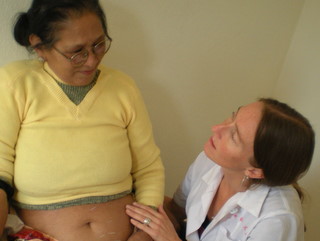
I wanted to take a moment and share some reflections of my time with the Acupuncture Relief Project in Nepal. I write with a longing in my heart, and lightness or thankfulness, for what the experience has been. ...Longing for the opportunity to be treating patients in need, longing to see those familiar smiling faces that the first week were so unknown, and longing to fall into the simple rhythm of my life at the monastery, mealtimes with the monks, Nepali tea, and early mornings on the rooftop. ...Thankfulness for the experience of new places, new people, shared experiences with friends, and endless hours of conversation with those friends distilling out the nuggets of our learning.
Through my time at the clinic, I have had the opportunity to explore more deeply the quality and accessibility of my education & clinical experience from the Oregon College of Oriental Medicine (OCOM). What can I say – thank you OCOM for the very solid foundation in Traditional Chinese Medicine (TCM) and the practical confidence to draw upon what I have learned time and time again. In Nepal, there were some extremely complicated cases that would come into the clinic and it was easy to feel overwhelmed by where to start. It was nice to have this experience early on in my "career" – I am more prepared for it now and have more ideas about how to take a deep breath, lean into the unknown and what might feel difficult, and trust that acupuncture works.
I also have a greater practical foundation in western medicine. I gained confidence in recognizing what conditions really needed referrals – for most people in Nepal money is an overwhelming obstacle. I gained practice in taking a symptom picture and fitting the pieces together. I feel that many people walked in with a story and though they usually did not know the name for what they were experiencing, I could understand their issue. I often found myself at night reading through the pages of the Merck Manual - researching certain conditions, thinking about what kinds of treatment are available, or how to best explain to the patient what was happening in their body. In the end, it all came down to how a person felt with treatment. As Kalpana noted in her letter... "people get well and feel happy".
I also value experiences that offer a different perspective than what our normal day to day experience is. I like the shift in what "normal" is because it keeps me open to change, and less attached to the world as I might get used to it being simply through pattern and habit. I like it when the power goes out for 40 hours every week. I like having to figure out how to needle or just palpate someone through 20 feet of material wrapped around their waist when they come in (known as a zumi in Newari but commonly referred to by us as "the armor") with a chief complaint of low back pain. I like weathered faces and smiles that reveal compassion and beauty. I like it when so many things don't matter – like the nature of your clothes, the shoes on your feet, and the house were we live. Instead we get to honor and connect to the person in each of us – the eyes that we meet. One of the greatest gifts of Nepal was the nature of the way people say hello and goodbye. The phrase is "Namaste", while the hands are placed together close to the front of the chest or the face - even slightly touching the space between the eyes on the brow. It's the pause, the moment of eye to eye contact that happens, the moment of stillness - when one is either coming in or leaving. It's not casual - or formal - it is a moment of intention with one another. It's a gift of stillness for a moment, never compromised.
My appreciation goes out to each patient that provided me with an opportunity to learn. My appreciation also goes out to Nicky, the Clinic Director -- she's amazing for figuring out how to make it work everyday! Also to each interpreter and the front desk/front room staff - they helped to make this experience as valuable as it has been.
It's good to be "home" -- and sad to be gone. Namaste ~ Diane Wintzer











